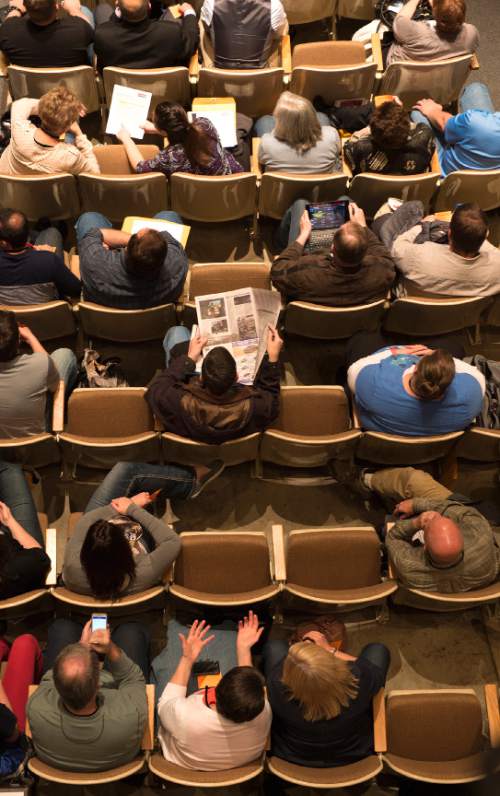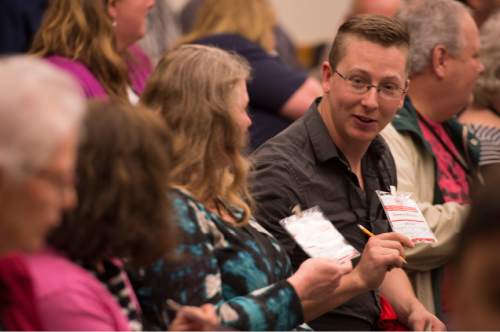This is an archived article that was published on sltrib.com in 2016, and information in the article may be outdated. It is provided only for personal research purposes and may not be reprinted.
Delegates to the Republican and Democratic state conventions this Saturday are far more extreme in their views than typical voters in their parties, a new study says.
Opponents of the caucus-convention system have long argued exactly that and have further said that those delegates elect candidates who are more extreme, less representative of mainstream voters and less likely to seek compromise.
Those are the factors cited by the group Count My Vote in pushing to replace conventions with direct primaries. A compromise law, SB54, allows candidates to qualify for a primary election either by collecting signatures or through the traditional caucus-convention system.
The nonpartisan Utah Foundation research organization released results Thursday of a poll that compared delegates to voters in their parties. It asked a series of questions to allow respondents to choose between positions that are traditionally liberal or conservative.
"While 27 percent of Republican voters were 'consistently conservative,' 46 percent of Republican delegates fell in the same category," it said. In other words, GOP delegates are much further to the right than typical Republican voters.
"On the Democratic side, 55 percent of the voters were 'consistently liberal,' while 75 percent of the delegates fell in this category," it said — showing Democratic delegates are further to the left than most of that party's voters.
Rich McKeown, executive co-chairman of Count My Vote, said such findings support his group's contention that the caucus-convention system is not truly representative and leads to extremism in politics.
"Polling has consistently indicated that they [voters] would rather exercise this franchise on their own," he said, "rather than have it exercised by a small group of delegates."
McKeown added that even with crowded caucuses this year, fewer people voted in this year's presidential race than in recent years when presidential primaries were held.
"We want to enhance voter turnout. The Republican Party in particular has dug in its heels to try to preserve an antiquated system that serves a few, but does not serve a majority of Utahns," he said, referring to multiple losing lawsuits the GOP filed to challenge SB54.
With SB54 in place, McKeown expressed optimism that voter participation will increase as their choices expand.
For example, Sen. Lincoln Fillmore, R-South Jordan, would have eliminated challenger Rich Cunningham, a House member from South Jordan, by winning 60 percent of the votes of a relatively small number of delegates at last week's Salt Lake County GOP convention.
But Cunningham collected enough signatures, so the pair will compete in a June primary in which a much larger number of Republicans will be eligible to vote.
In Davis County, Rep. Becky Edwards, R-North Salt Lake, won 70 percent of delegate votes at the county GOP convention. But challenger Glen Jenkins will still face her in a primary because he gathered enough signatures.
In a Weber County Commission race, three candidates had gathered enough signatures before the county convention to qualify for the primary. But after Jim Harvey won more than 60 percent of delegate votes, current state Rep. Brad Dee, R-Ogden, dropped out of the race because of the delegate vote, and urged Caitlin Gochnour to do the same. She has remained in the race.
Party extremism is one reason that moderate state Rep. Kraig Powell, R-Heber City, dropped out of his race Wednesday. The four-term lawmaker was one of just a handful of candidates statewide who had sought to bypass the convention system entirely and rely only on collecting signatures instead to qualify for the primary.
But he said that brought attacks from his GOP opponent, Tim Quinn, that Powell wasn't a real Republican. He also said the current system makes it easier for Republicans who are more extreme.
Powell, who does not accept donations from special interests, said the conservative "Koch brothers and their PAC, Americans for Prosperity, began expensive attack mailers in my district last week," which he cannot afford to counter.
He said he did not like the negative campaign, so he bowed out.
"It was starting to tear our community apart, and I just don't want that negativity. It's the [Donald] Trump and [Ted] Cruz mentality," said Powell, who was the state chairman for Ohio Gov. John Kasich. "I didn't want to go down that sort of negative road."
Utah Democratic Party Chairman Peter Corroon told a forum about the study Thursday at the University of Utah's Hinckley Institute of Politics, saying that SB54 may help moderate Utah politics over time.
"It can eventually help bring us to the middle of political representation in the state," he said.
Kathleen Anderson, president of the Utah Federation of Republican Women, agreed, saying it will allow some candidates to advance "who probably wouldn't proceed past convention if they were vetted by the delegates."
The new study said delegates may not be truly representative in some other ways, such as in gender and religious beliefs.
For example, it said 56 percent of GOP voters are female, but only 24 percent of party delegates are women. Meanwhile, 55 percent of Democratic voters are women, but only 47 percent of its delegates are female.
"I wish more women were involved," Anderson said, guessing that men may dominate here because the culture is "a little more patriarchal," or perhaps women with children find it more difficult to attend party caucuses.
The study said 84 percent of GOP voters are Mormon, but an even-higher 93 percent of delegates are LDS. While 30 percent of Utah Democratic voters are LDS, only 24 percent of delegates are.
Also, while 35 percent of Democratic voters belong to no religion or church, 52 percent of their delegates fall into that category.





